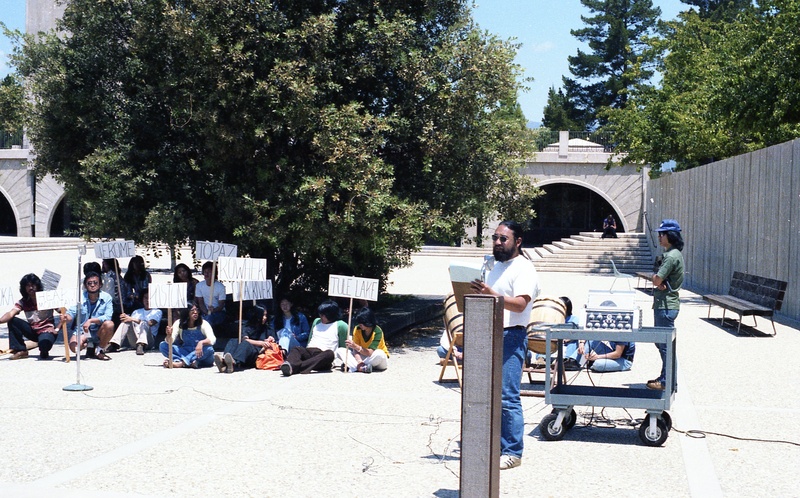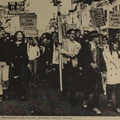The new administration has made me contemplate how I fit into the new definitions being made and implemented. Since the renaming of geographic locations now appears to be standardized, I wonder about how DEI, and then citizenship will be standardized.
I was a DEI (Diversity, Equity, and Inclusion) hire in one of the first jobs I found after earning a BA. I worked in an academic program in the university dedicated to assisting low-income and first-generation to college students after receiving my BA. One of the academic advisors there suggested I apply for a job in a nearby university as the Asian American EOP coordinator. She helped me understand what a resume is, and I was able to prepare one and send it in application for the position. I had no idea about job searches or career development after graduation, and did not even know how to ask for assistance.
The position was in the Educational Opportunity Program at the institution. The concept for EOP was to assist minority students to access and be successful scholars in the university. This is the very definition of DEI. I was hired to be the Asian American EOP coordinator, the first full-time staff person to take that position. The position was created after a years-long struggle by students at the institution to have a staff person dedicated to serving Asian American students as there were staff to serve African American and Chicano students in EOP. Native/Indigenous students and Asian American students in EOP were served by the African American and Chicano staff in alternating years. This was a feeble and ineffective strategy by the university to address the needs of Asian American and Native/Indigenous students.
Although born in a small town in Wyoming, I never doubted myself as a Japanese American. The town still has a population of about 2,500, with some of my relatives still there. My experiences working with DEI programs and efforts solidified my sense of being Asian in America. The argument for Chicano EOP was to note the population of Chicanos in California. The argument for Black EOP was to note the population of African Americans in the US. The logical argument for me was then to note the population of Asians worldwide. It was apparent to me that using a population model for justifying EOP efforts was not tenable, and I realized that there was poor understanding of Asian Americans in the institution.
At some point in time some bureaucrat decided that it was a good idea to combine Asians and Pacific Islanders in the same population category. After spending 17 years in Hawai‘i, I learned that the diversity among Pacific Islanders and Asians at least matched the diversity in Latino and African American populations. Latinos have similar language as a common cultural marker. But among Asians, Pacific Islanders, and Africans, there is no unifying language and the cultures are rich and varied. As an Asian American, and especially as a Japanese American (the only Asian population in the US that is declining), I know the value and the need to recognize and respect each culture, each language, and each community.
With the current administration’s efforts to eliminate DEI efforts, the thousands of students served by EOP would not have any dedicated assistance to become successful scholars, and many first-generation to college students will not have any assistance in finding and being admitted to post-secondary institutions. The elimination of DEI will bring colleges and universities back to the situation in which students who could be successful scholars will not have the opportunity due to poorly instituted admission efforts, and those who are admitted will have obstacles to overcome because of lack of assistance due to cultural ignorance and insensitive attitudes. The reasons for the establishment of DEI efforts has not changed over the past 75 years. Why go backwards in this respect instead of moving forward?
Similarly, I think of my citizenship in the present. But if the citizenship by birth is eliminated, how far back can that concept be implemented? My family legend is that both my grandfathers were undocumented. This would mean that my parents were not citizens if citizenship by birth is rescinded. Then by extension, I am also not really a citizen of the US. Would I then be deported to Japan? I visited Japan, and realized quickly how un-Japanese I am. Not only do I know little of the Japanese language, I don’t even know how to use the telephones there, and how to act in the Japanese society. If I had children, would they be taken from me and sent to an unknown and unknowable location? Would my votes in the past elections be voided? Would the elections be deemed illegal, since non-citizens had voted in them? All of the logical extensions of such administrative and bureaucratic actions by the executive branch are very concerning and troubling to me.
I have not been prone to conspiracy in the past, but the present actions seem clearly pointed to creation of a situation in this country where the wealthiest will wield the most power, and their goal is to accumulate the most wealth at the expense of the near future for the planet and the 99.9 percent of the population who are not at the economic peak of the planet.
In my eighth decade, this all seems clear to me. I feel distress that so many have no knowledge of what happened in Hiroshima and Nagasaki. Too few connect the incarceration of Japanese Americans, the Holocaust in Europe, and separation of families at the southern border of the US. I call on anyone and everyone to consider the current state of the country, and join me in voicing concerns and opinions.
Views expressed are those of the author and do not necessarily reflect the views of Discover Nikkei.
© 2025 Thomas M. Nishi











